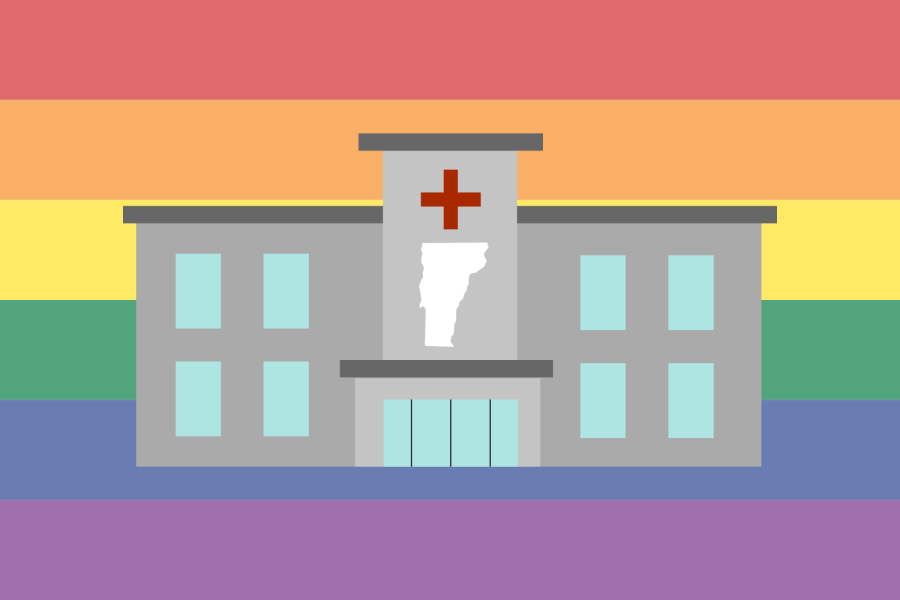Local healthcare nonprofits provide specialized care for LGBTQ+ community
LGBTQ+ healthcare nonprofits in Vermont offer different, specialized care compared to traditional medical practices.
The nonprofits provide services such as HIV/AIDS services, hormone therapy and gender-affirming care, according to the websites of Vermont CARES and the Community Health Centers of Burlington.
Community based LGBTQ+ specific healthcare is crucial in allowing clinics to offer specialty care where a provider may be more experienced, said Rachel Inker, family physician at Community Health Centers of Burlington.
“A dedicated clinic offers a degree of specialty care and a place where often people feel more comfortable,” Inker said.
The Movement Advancement Project researches levels of equality across the nation as provided by state governments. The organization rates Vermont’s LGBTQ+ healthcare as six out of 6.5 points, which is No. 6 in the nation, according to the website.
Criteria for the ranking included private health insurance, nondiscrimination laws and state Medicaid policy as it relates to transgender people. It does not take into account the role of nonprofits.
UVM’s Children’s Hospital houses the Transgender Youth Program, a program that helps to provide resources such as hormone suppression and gender-affirming hormone treatment to transgender children and teenagers.
This does not account for transgender adults in the state and any healthcare needs they may require, according to their website.
Inker is the lead provider at the Community Health Center of Burlington’s Transgender Health Clinic and runs a weekly trans-specific clinic that helps to fill that gap, she said.
The Community Health Center of Burlington started several years ago to have a LGBTQ-only clinic, called the Be You Clinic. It was created as something to help fill the gap in LGBTQ+ healthcare in Burlington, Inker said.
The Be You Clinic offers services including hormone treatments, STI testing and primary care for LGBTQ+ individuals, partners and their families, according to their website.
“Community based healthcare really allows people and their healthcare providers to meet where they are,” Inker said.
Peter Jacobsen is the executive director of Vermont CARES, a nonprofit that works with people in the community affected by HIV/AIDS.
Along with having the option to meet a healthcare provider in a place that may be more comfortable than a hospital, community healthcare is important as the workers are there as a way to support patients with specific needs, Jacobsen said.
These nonprofits don’t just provide primary care services, they also provide health education and awareness. Vermont CARES is an organization that has seen its mission evolve over the years as needs change, Jacobsen said.
“We used to give presentations that [described] what HIV is,” Jacobsen said. “And now the conversations have evolved to include queer healthcare more broadly.”
Community based healthcare is also a way to engage with the wider community, Jacobsen said.
“The work [is] really exciting because you get to be agents of social change, while also being agents of individual change,” Jacobsen said. “We’re community, we celebrate with community.”
The organization also runs a harm reduction program to help protect drug users from HIV/AIDS, highlighting a growing sense of community supported by these organizations, Jacobsen said.
The Gay & Lesbian Fund of Vermont is a middle man between donors and nonprofits, that allows the nonprofit to know that the donor is a member of the LGBTQ+ community, said Roland Palmer, director of engagement and operations at the fund.
“Presence is part of the reason that we exist,” Palmer said. “There is sort of an invisibility and so being out there and showing that we are part of the grander community is really important.”
The fund passed donations to 38 healthcare organizations, along with 11 HIV/AIDS specific organizations, according to their website.
The fund helps to highlight how LGBTQ+ people are part of the wider community, Palmer said.
UVM students have the possibility to help these organizations support others in the community either through donations, volunteering or just showing up in support.
It is imperative that students are involved in supporting the healthcare nonprofits in their communities, Jacobsen said.
“Students are the leaders of public health,” Jacobsen said.
